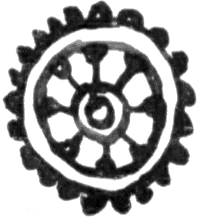- Memorize the endings of the imperfect, in the parasmaipadam and ātmanēpadam, and understand its meaning. Practice using the exercises below.
- Memorize the paradigms of i- and u-stem nouns and adjectives, in all three genders. Practice using the exercises below.
- Understand how sentences can be embedded in other sentences using the particle iti.
The Imperfect (laṅ)
Adhyayanavidhiḥ: the past-tense augment; consult the secondary endings under personal endings; the imperfect forms are listed under each verb class: see for instance the first class.
The word iti
i- and u-stems (ghi)
Adhyayanavidhiḥ: stems in i; stems in u
Here are a few resources to get you started:
- Quizlet flash cards for the imperfect:
- Quizlet flash cards for the nominal forms:
1. Imperfect (laṅ) forms
Produce the imperfect form in the specified number and person. You must know (a) what padam the verb is conjugated in, and (b) what present class the verb belongs to.
- √cint, second person dual (madhyamapuruṣadvivacanam)
- upa-√pad, third person singular (uttamapuruṣaikavacanam)
- √labh, first person dual (uttamapuruṣadvivacanam)
- ā-√gam, third person plural (prathamapuruṣabahuvacanam)
- √vad, third person singular (prathamapuruṣaikavacanam)
- ā-√pad, second person plural (madhyamapuruṣabahuvacanam)
- √īkṣ, first person singular (uttamapuruṣaikavacanam)
- upa-√diś, first person plural (uttamapuruṣabahuvacanam)
- √cur, second person singular (madhyamapuruṣaikavacanam)
- √ruc, third person plural (prathamapuruṣabahuvacanam)
- √spr̥ś, third person dual (prathamapuruṣadvivacanam)
- √rac, first person dual (uttamapuruṣadvivacanam)
- √muc, second person plural (madhyamapuruṣabahuvacanam)
- √yat, second person dual (madhyamapuruṣadvivacanam)
- pra-√īkṣ, first person plural (uttamapuruṣabahuvacanam)
- √śaṅk, second person singular (madhyamapuruṣaikavacanam)
- √ram, third person dual (prathamapuruṣadvivacanam)
- √vas, first person singular (uttamapuruṣaikavacanam)
2. ghi forms
Produce the following phrases in Sanskrit, in the given number and case.
- the teacher’s (guruḥ) instruction (upadēśaḥ, nominative sg.)
- the teachers’ (guruḥ) instruction (upadēśaḥ, nominative sg.)
- many (bahu-) tears (aśru, nominative pl.)
- many (bahu-) tears (aśru, locative pl.)
- by the power (śaktiḥ, instrumental sg.) of things (vastu, genitive pl.)
- by the powers (śaktiḥ, instrumental pl.) of the mind (matiḥ, genitive sg.)
- of the small-minded (laghu-mati-) king (nr̥paḥ, genitive sg.)
- for the small-minded (laghu-mati-) king (nr̥paḥ, dative sg.)
- the best (śrēṣṭha-, nominative sg.) among the [two] poets (kaviḥ, locative du.)
- from the tear (aśru, ablative sg.) of the poet (kaviḥ, genitive sg.)
- many (bahu-) ideas (buddhiḥ, nominative pl.)
- many (bahu-) ideas (buddhiḥ, accusative pl.)
- in the great (bahu-) fire (agniḥ, locative sg.)
- from a small (laghu-) thing (vastu, ablative sg.)
- a woman (strī-, nominative sg.) of great (guru-) power (śaktiḥ, genitive sg.)
- a woman (strī-, nominative sg.) of great power (guru-śakti-, bahuvrīhiḥ)
- women (strī-, accusative pl.) of great power (guru-śakti-, bahuvrīhiḥ)
- with fire (agniḥ, instrumental sg.) and tears (aśru, instrumental pl.)
- for a poet (kaviḥ, dative sg.) who has no recourse (a-gati-, bahuvrīhiḥ)
- along the path (gatiḥ, locative sg.) of great (guru-) poets (kaviḥ, genitive pl.)
3. Sanskrit to English
- vidyā-dānam · śrēṣṭham · dānam · iti · uktam · gurubhiḥ ·
- dharmēṇa · ēva · tuṣyanti · dēvāḥ · iti · gurūṇām · vacanam ·
- api · ētat · gurōḥ · gr̥ham · iti · śiṣyāḥ · aśaṅkanta ·
- kasmāt · hētōḥ · dēvī · viṣaṇṇā · iti · nr̥paḥ · apr̥cchat ·
- taiḥ · puruṣaiḥ · nr̥paḥ · iti · śabdaḥ · api · na · smr̥taḥ ·
- bahūni · aśrūṇi · muktvā · kanyā · upadēśam · smr̥tvā · punaḥ · atiṣṭhat
- tasmin · kālē · na · kaścit · kiñcit · acōrayat · iti · akathayan ·
- yadyapi · guru-vacanam · satya-vacanam · iti · amanyāvahi · tathāpi · na · guruṇā · samagacchāvahi ·
- yam · lēkham · alikhaḥ · saḥ · avagantum · na · śakyaḥ · iti · tasya · artham · apr̥ccham ·
- bahūni · ratnāni · apēkṣatē · ēṣaḥ · yajñaḥ · iti · matvā · nr̥paḥ · na · ayajata ·
- nr̥paḥ · na · yajatē · iti · purōhitāḥ · viṣaṇṇāḥ · abhavan ·
- ētat · kāvyam · laghu · iti · tat · śramāt · bhayāt · apaṭhāma ·
- kutra · nr̥pasya · matiḥ · gatā · iti · dēvī · yadyapi · acintayat · tathāpi · na · kiñcit · avadat ·
- tē · kāryāṇām · gatim · draṣṭum · aicchan · tām · tu · na · kaścit · draṣṭum · samarthaḥ ·
- agninā · asiñcat · iti · yad · kavinā · uktam · vacanam · na · tat · upapadyatē ·


